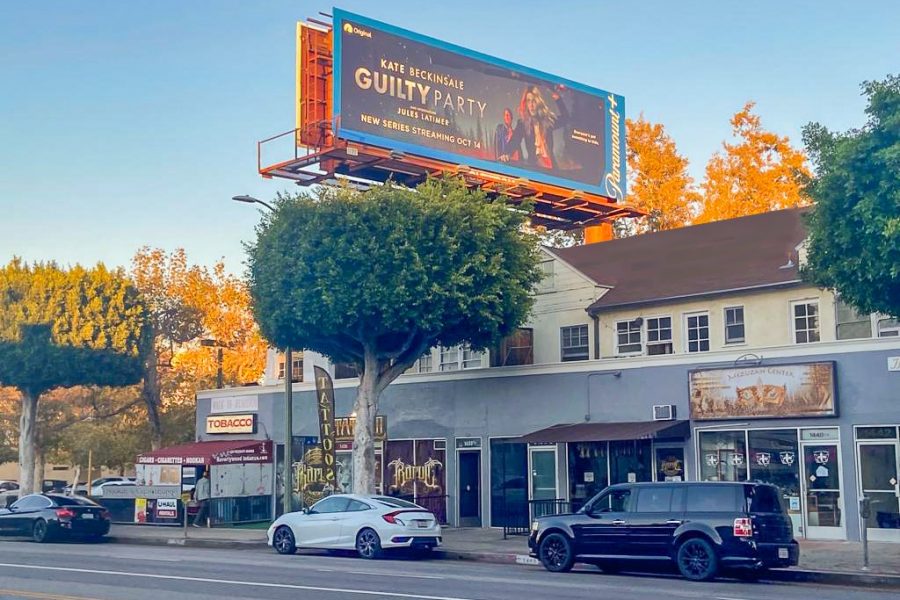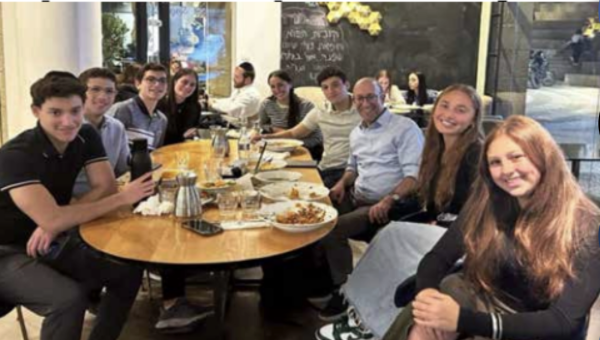Hotel or housing? City Planning Commission deciding future of key intersection tomorrow
Developer cites needs of Jewish community but is not promising Jewish amenities
February 18, 2022
Tomorrow, the Los Angeles City Planning Commission is expected to vote on whether to approve a hotel near the intersection of Pico and Robertson boulevards, which its developer says would serve both the neighborhood and the local Jewish community.
What it would not do is add any housing to the area. Instead, in replacing low-slung buildings at 1434-1456 South Robertson Boulevard — next to the Walgreens parking lot — it would demolish 12 rent-controlled apartments, and add a fifth hotel walking distance from the shops, restaurants and synagogues of Pico-Robertson neighborhood.
According to its permit application, the proposed “Soro Hotel” (its name references “South Robertson”) would be about six stories high and have 131 rooms, plus a cafe and various amenities.
“That portion of Roberston, it hasn’t been developed as much as other areas on Pico,” said Mr. Dan Harkham, who owns the land and has applied with Sinanian Development Inc. to build the hotel.
“Our main goal is to beautify and help enhance the experience both for the local community and for the greater Los Angeles community as well.”
Others say that right now, more housing is needed more than more hotel space. Within about a mile of the site are the Residence Inn and Beverly Hills Marriott near the intersection of Pico and Beverly Drive; Mr. C at Pico and Beverwil, and the Carlyle Inn just north of Pico on Robertson.
According to government estimates, there are more than 40,000 people experiencing homelessness in the city of Los Angeles at the present time.
The new hotel would replace 12 rent-controlled residences, along with small businesses including Le Petit Jardin restaurant and flower shop. Tenants of the apartments would be displaced with no new housing provided, either as set-aside residences in the hotel or by the developer elsewhere.
“There are so many, already, hotels in this area and not enough housing,” said Ms. Elizabeth Borie, a tenant in one of the buildings at the project site.
“And there’s such a homeless crisis in the city of Los Angeles alone that it would be tragic to tear down a building — a residential building — especially one that had senior citizens, and especially with the rent control that we have here,and also to tear down these beloved stores in this community that people rely on.”
But Mr. Harkham — a Shalhevet alumnus, class of 2000 — said it would help the neighborhood.
“All those guests and all those people who come — what are they gonna eat, where are they gonna shop?” asked Mr. Harkham.
“Where are they gonna pick up the groceries if they want some snacks or to have a meal?” he said in an interview this week. “It’s all gonna be in our neighborhood, and I think that that is a huge ‘get.’”
Mr. Harkham said the hotel would be good for businesses, synagogues and neighborhood residents who would have another place to house guests for weddings, holidays and bar mitzvahs.
“Especially after Covid, where synagogues have taken a big hit,” Mr. Harkham said.
Another part of the case Mr. Harkham has made for his Soro Hotel — this one in the development’s permit application — is that it would service particular needs of the area’s many Jewish residents. That’s the application the Planning Commission will be ruling on tomorrow.
The application states that the hotel would offer “affordable accommodations to serve the specialized needs of the Pico-Robertson Jewish Community,” saying “there are no hotels serving these special needs” and naming kosher food, kosher banquet facilities, and ways to observe Orthodox restrictions on operating machinery or making business transactions on holidays and Shabbat.
“There are so many, already, hotels in this area and not enough housing.”— Ms. Elizabeth Borie, a tenant
However, in his interview with the Boiling Point Mr. Harkham was unsure whether the hotel would include such amenities, saying nearly everything was still up in the air.
He also said he was hoping to franchise the Soro to a hotel chain.
“We’re looking to franchise, most likely,” Mr. Harkham said. “Options are open, but our first inclination is to go towards a franchise and from there we’ll see what opportunities arise, but we think about both: everything’s open really.”
He said that negotiations had been interrupted by the Covid pandemic, making some things less clear.
“We had many conversations and then they all got shut down,” said Mr. Harkham. “So at this point, we said let’s not get too involved necessarily with figuring out what and who and where and why, but let’s see what we can accomplish.”
Ms. Priscilla Sotelo Klisch, who lives with her father in one of the buildings that would be torn down, said the hotel would detract from the community more than it would benefit. Her family has owned Le Petit Jardin for 27 years, the French restaurant and flower shop downstairs,
“I know that a lot of my customers when they heard of the news, they were very upset,” Ms. Sotelo Klisch said in an interview, “saying we don’t need a hotel but we do need small shops like yours, that give us flowers for holidays, give us a nice place to eat.
“They take comfort in knowing that we’re there and that we’re always there,” she said, “to not just be providing them with food, but an ear for them to have or a friend in a way.”
Ms. Borie agreed.
“It just is appropriate to kind of do our part to pick up the area… It’s a bit run down, and I think bringing more opportunity there [is good] not just for the Jewish community but for the city of Los Angeles.”— Dan Harkham, developer
“There’s stores that have been here over 20 years,” Ms. Borie said. “Community-loved stores and restaurants and this is a place where people come, where they eat, where they congregate.”
Mr. Harkham said his company is settling with tenants and trying to do their best to do right by them.
“We’ve settled and amicably helped move eight of the 11,” Mr. Harkham said, excluding an additional building that has only one unit. “And we won’t be doing this project until we have the building vacant and the residential tenants taken care of in a way that is fitting.”
Ms. Sotelo Klisch said the offers wouldn’t cover her family’s loss.
“When you offer a certain amount of money, they’re not putting into consideration my father’s age, our situation, the fact that we kind of work from home — we have the restaurant downstairs, we live upstairs,” said Ms. Sotelo Klisch. “It’s not gonna be easy for us to just up and move… I don’t think I would call that help — I would call that an offer but not a serious or compassionate offer.”
Ms. Borie said Mr. Harkham’s company has been threatening to evict them since 2016.
“They have been traumatizing us since 2016 with their threats of kicking us out, saying there’s nothing we could do and they’re kicking us out,” Ms. Borie said. ”A few times a year threatening this — so that we’re at the point I’ve had major anxiety attacks and insomnia because I’m afraid that I’m gonna be homeless and thrown on the street. That’s not okay.”
Mr. Charles Carnow, a research analyst with Unite Here Local 11, a hospitality workers union representing workers in Los Angeles hotels, said financial settlements were not a real solution.
“Even if you know that offer was made, we’re still losing several apartment units, when really what we need is to increase the number of apartment units to deal with the housing crisis in Los Angeles — rather than destroying it for a hotel,” said Mr. Carnow, who has been working with the tenants.
He said the mostly-residential neighborhood is “fairly well served by hotels already, whereas we have a huge need for housing.”
With the meeting set for tomorrow, Mr. Harkham was unsure if the project would be approved. He thinks that it has a 50-50 chance. If it were to be approved it would break ground in a little under a year, he said.
He said his company was not considering adding residential units to the project.
“If it gets rejected,” Mr. Harkham said, “we’re going to come together as owners and try to find another option, perhaps a hotel or another kind of opportunity again with focus on the community. Our emphasis essentially is, in that site, that there’s a need in that portion of the city, a portion of Pico Robertson.”
He said the project had actually been partly approved about three years ago, but because he acquired an additional building next door after the original approval, they had to re-apply, leading to Thursday’s hearing.
“What we need is to increase the number of apartment units to deal with the housing crisis in Los Angeles.”— Charles Carnow, research analyst with Unite Here Local 11
He also said even if the City Planning Commission okays it, they’ll need further permits from the city.
And he said had they known the requirements of the city would be this great when they submitted their application, they would have “weighed their options” and looked into possibly building apartments — though they wouldn’t have discarded the hotel option.
“It just is appropriate to kind of do our part to pick up the area,” Mr. Harkham said. “It doesn’t look so good, it’s a bit run down, and I think bringing more opportunity there not just for the Jewish community but for the city of Los Angeles. There’s a lot of job openings when it comes to hotel obviously, and the opportunity to help enhance that portion of Robertson.”
Both Ms. Borie and Ms. Sotelo Klisch said they would be attending the Planning Commission meeting, and Ms. Sotelo Klisch also plans to speak.
“I’ll support whatever the city suggests,” Ms. Soleto Lisch said. “But of course I’m going to try to argue my case that it’s not a project that we need right now, and that if they do consider also the affordable homes for people.
“Because if you take affordable homes away, you have to have a solution for: okay well what then — are you replacing them? That is something that needs to be answered.”
Originally published in The Boiling Point on November 17, 2021.
This story is one of two stories by the author which won First Place in the Ongoing Reporting category.
JSPA Judges’ Comments: Excellent two-part coverage of a topic of great interest to the immediate community of Shalhevet. Thorough package that includes voices of all the actors involved.










